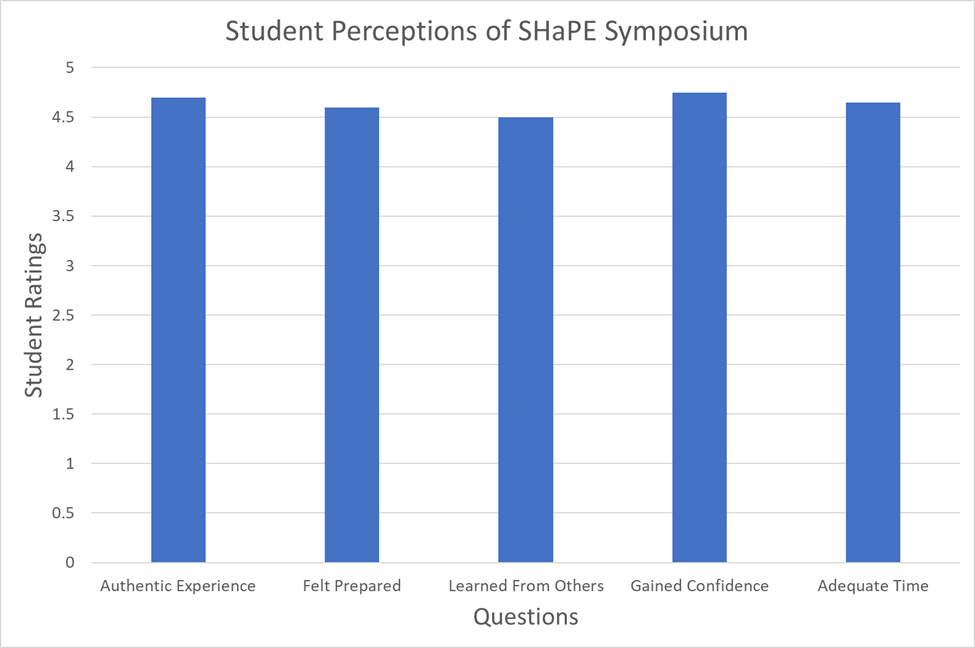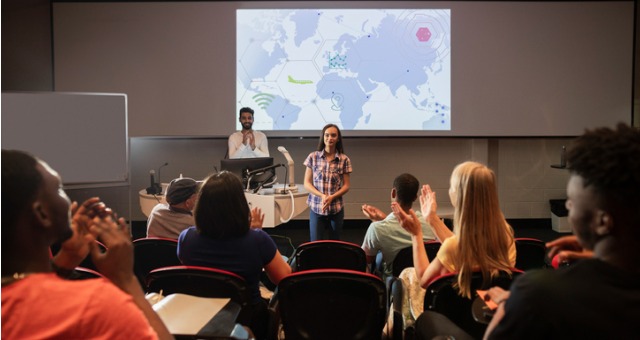Students often enter undergraduate research-based courses feeling academically underprepared and/or intimidated by the task of understanding and presenting research to their peers and professionals. The courses that focus on research are foundational for social sciences majors. For many students in these courses, it is their first exposure to learning and applying the process of scientific inquiry, critical thinking and analysis, research and design, literature review, and statistical analysis. At Grand View University (GVU), the social sciences and education faculty have collaborated for almost a decade to create a biannual, university research symposium, both in-person and online, to prepare students for their vocations. This student-centered approach to learning was designed to be project- and skills-based, and integrated an appreciative inquiry framework.
Appreciative Inquiry (AI) framework
The basic tenet of applying AI in academic learning is to help students create awareness of their strengths and interests through appreciative dialogues, initially between the student and their professor. AI utilizes reflection, introspection, and collaboration to identify and apply concepts personally and professionally. According to Cooperrider and Srivasta (1987), AI is a process for facilitating positive change. The pedagogical focus was for students to design and present a research, literature review, or application project related to their curricular interests at the University’s research symposium. Project-based learning with a focus on developing transferable skills also emphasizes asking questions that motivate students to focus on central concepts and principles concerning their discipline. Furthermore, the dialogue involves students and faculty to participate in an authentic skills-based experience to present research and learn from their peers’ presentations (Martini, Judges, & Belicki, 2015).
Using the AI 4D design, students were asked at least one of the following questions from each category when exploring research interests in their psychology courses; the responses guided their course project.
- Discovery: What are your strengths? How did you use your strengths to critically think about the research topic? What did you like best about your experience? Why did you select the particular research area? What were your personal learning goals? Were you able to meet these goals through the course activities? What peer evaluation resonated with you the most?
- Dream: What do you hope to accomplish based on your research? How do you think it aligned with your strengths, values, and/or career aspirations?
- Design: How effective was your research design (selection of literature, methods, etc.)? What motivates you in your chosen career and program of study?
- Destiny: Are there differences in what you planned and what you are doing? What strengths were further developed? After reflecting on the judge and peer evaluations, in what ways did your research experience change (or transform) or align with your ideals? Were some of your goals reached? What transferable skills were used and how will you incorporate them in your vocation?
Incorporating the AI conceptual framework, by asking positive questions, and integrating strengths into psychology course assignments, fostered collaboration, and encouraged personal and organizational growth.
Research questions and methodology
Professors from a private, midwestern university from five departments: Social Work, Sociology, Human Services, Psychology and Education (SHaPE) collaborated to have their undergraduate students participate in a research symposium, which were part of their homework assignments. The faculty used the AI framework and instructional methods to help students design their projects and presentation posters. Faculty also provided opportunities for students to work on research, data collection, and practice their presentations prior to presenting at the Symposium. At the SHaPE Symposium, students taught their peers, judges, and other professionals about their area of study using a poster presentation format.
The psychology faculty combined symposium data from the last five years for this study. This data consisted of 1,062 responses from seven semesters between 2018 to 2022. The SHaPE Symposium was held in-person with the exception of two virtual semesters during the Covid-19 pandemic. Knowing that there may have been differences between the classes and faculty teaching different courses and sections, a one-way ANOVA was calculated. It indicated that no significant statistical difference existed. Furthermore, a post hoc Tukey pairwise comparison also did not reveal any significant differences among the course sections and mode of delivery.
For the purposes of this analysis, data was interpreted from the SHaPE Symposium student evaluation responses which aligned with our research questions. Students were asked to rate their experience using a 5-point Likert scale with a 1 being strongly disagree and with a 5 being strongly agree. In addition, psychology faculty reviewed end of the course evaluation comments regarding the Symposium.
Research questions
- To what extent did you feel the symposium was an authentic experience? (design, dream, discovery)
- In preparing your poster, were you taught how to design a research poster? (design)
- Did students learn from evaluating other student’s posters? (destiny, discovery)
- Did students gain confidence in their ability to present their research? (discovery, destiny, design)
- Did students feel prepared to present their research in a professional setting? (discovery, design)
Results
Quantitative data was collected from 1,062 students who participated in a SHaPE Symposium over a five-year period from 2018 to 2022. Of the students who responded to the survey on a 5-point Likert scale (1 strongly disagree and 5 strongly agree):
- Students overwhelming felt the symposium provided an authentic experience to present research and learned from other students’ research (mean average:4.68).
- A majority of students felt prepared and agreed that they were shown examples of past work (mean average: 4.63).
- Students agreed that they learned something new from evaluating other student posters (mean average: 4.49).
- Students strongly agreed that they gained confidence in their ability to talk about the topic they had presented on (mean average 4.7).
- Students agreed that they had a reasonable amount of training and time to complete their poster (mean average: 4.6).

Qualitative data from several students who participated in SHaPE shared the following quotes:
Discovery: One student conveyed, “I really liked SHaPE and all the different projects.” Another student appreciated the peer interactions. “It was fun to see my friend’s poster and for her to see mine (learn from each other).”
Dream: A student communicated, “I learned a lot from this class in regard to the evaluations and assignments, including SHaPE. The instructor was always open to answer any type of question and always gave great feedback on projects and assignments.”
Design: Focusing on design was really important for this student. “I feel like I had to really know my stuff for SHaPE. I had to be able to explain it to someone else in a way that they would get it and understand why it was important.”
Destiny: A student shared his/her perceptions related to the SHaPE presentation. “I thought SHaPE was more challenging than presenting in Chicago. At MPA, (Midwestern Psychological Association) people were just interested in what we did whereas at SHaPE we were graded and judged. So, once we got to MPA, I was like ‘this is way easier.'” Another student shared, “This class was taught in a way that anyone could understand the material and apply it in situations after graduation.”
Applying the AI model and analysis
Our results indicate that the collaboration among faculty over campus, the AI design framework, and the instructional framework created an authentic poster presentation experience for them to present research. Furthermore, their confidence in their ability to present research in front of their peers and mentors increased as a result of their semester long experience of creating their posters in their individual courses.
Conclusion
After implementing an appreciative inquiry approach to teach research, we have found that students are able to acquire skills, gain confidence in their knowledge and ability to present, and learn to interact with their peers and mentors. Furthermore, these skills are highly transferable to employment and graduate school settings. Using the AI framework built on student strengths and confidence in their abilities.
Dr. Jill Sudak-Allison is an associate professor who joined the Department of Psychology and Human Services at Grand View University in the fall of 2014 and became department chair in fall 2017. Sudak-Allison developed and implemented a clinical mental health graduate program at Grandview University. She teaches a variety of courses including introduction to human services, social psychology, abnormal psychology, counseling theories, individual/group counseling skills, and internship. She is also a licensed marriage and family therapist and licensed mental health counselor, and is trained in EMDR.
Dr. Kristine Owens is an associate professor who joined the Department of Psychology and Human Services at Grand View University in the fall of 2017 after five years of part-time teaching. She teaches a variety of courses including Psychology of Exceptional Children, Abnormal Psychology, Program Evaluation, Personality Theories, and Psychology of Health. In addition to teaching, she has over ten years of experience working with individuals with disabilities primarily certifying and implementing academic accommodations at the post-secondary level.
Dr. Josh Woods is an associate professor at Grand View University and is the director of the PSYC Lab where undergraduates work on projects they take to professional regional and national research conferences. Dr. Woods is a board member for the PsychONE conference at Duke University that is a hub for the best ideas for teaching general psychology. And he is a founder of the Coast-to-Coast conference that aims to increase accessibility and connection for all teachers of general psychology from across the United States and beyond.
References
Cooperrider, D.L. & Srivasta, S. (1987). Appreciative inquiry in organizational life. Research in Organizational Change and Development, 1, 129-169.
Martini, T.S., Judges, R., & Belicki, K. (2015). Psychology majors understanding skills-based learning outcomes. Scholarship of Teaching and Learning in Psychology, 1(2), 113-124.






